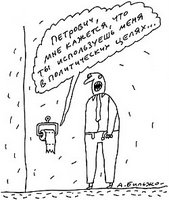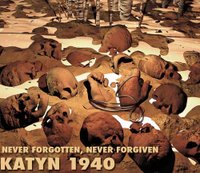 A Ukraine eternally condemned to be split between east and west is the image that persistently lingers on the retina of imagery as historical, cultural, lingual, and religious differences are allowed to dominate over unifying forces in world perceptions of the country's national identity. The image of a country fettered to its historic fate is today however confronted by a contrasting picture with roots in regional and national myths, linking together nations reunited in freedom at the shores of the Black Sea. Less known is that its origins are to be found in the ancient myth of Prometheus - the titan who stole the fire from the gods and gave it to man.
A Ukraine eternally condemned to be split between east and west is the image that persistently lingers on the retina of imagery as historical, cultural, lingual, and religious differences are allowed to dominate over unifying forces in world perceptions of the country's national identity. The image of a country fettered to its historic fate is today however confronted by a contrasting picture with roots in regional and national myths, linking together nations reunited in freedom at the shores of the Black Sea. Less known is that its origins are to be found in the ancient myth of Prometheus - the titan who stole the fire from the gods and gave it to man.Prometheus (Gr. he who thinks ahead) brought man the enlightenment - fire and knowledge - denied to her by higher powers. In eternal punishment, Zeus had him chained to a rock on mount Kaukasos, where an eagle was set to feast on his liver. His self-sacrificial torment was eventually ended by Hercules, who killed the eagle and set the titan free. Freed from his strains, Zeus still deemed the titan forever to carry the burden of a Caucasian cliff in the remains of his chains. In memory of Prometheus' suffering, man to this day bear stones in their rings.
The appealing Prometheus myth became the theme for the Ukrainian national poet's, Taras
 Shevchenko (1814-1861), epos Kavkaz (1845). The father of Ukrainian literature wrote the work in memory of a close friend - Yakiv de Balman - who had fallen in Russian service in the Caucasus that year. Its edge is however not directed against the Chechens, who had killed his friend, but against the injustices of the Russian empire in denying oppressed peoples their freedom. What today is perceived as expressions of budding Ukrainian nationalism and a strive for independence from Russia, to the contrary encompasses a more general vision of liberty and justice to all nationalities set to carry the burden of the Tsarist yoke.
Shevchenko (1814-1861), epos Kavkaz (1845). The father of Ukrainian literature wrote the work in memory of a close friend - Yakiv de Balman - who had fallen in Russian service in the Caucasus that year. Its edge is however not directed against the Chechens, who had killed his friend, but against the injustices of the Russian empire in denying oppressed peoples their freedom. What today is perceived as expressions of budding Ukrainian nationalism and a strive for independence from Russia, to the contrary encompasses a more general vision of liberty and justice to all nationalities set to carry the burden of the Tsarist yoke. The Prometheus myth was a recurrent theme in both revolutionary and other liberation movements. It is for example found in the nationalist and socialist struggles against Tsarist rule; on the Balkans in the fight against the Osman empire as well as subsequently in attempts by the Crimmean Tatars to receive support from the new Kemalist Turkey in the 1920s. However, it was foremost by the inception of the Promethean movement that the myth gained greater fame as a symbol in the struggle against Russian and Soviet imperialism, why Prometheism at times also has been interpreted as a form of Russophobia.
For posterity, the Promethen movement has mainly come to be associated with Poland and the
 authoritarian nationalism of Józef Piłsudski (1867-1935). The Polish leader's ambition to contain Russian expansionism got its ideological inspiration from Promethean freedom ideals and its geopolitical expression in Intermarum - a projected federation of states between the Baltic and Black seas to counteract first Russian imperialism then the Bolshevik threat and to quell the power of the soviets. The image that - with some justification - portrays Piłsudski both as the founder and the front figure of Prometheism however also serves to obscure a more nuanced picture of a once nascent regional movement. In reality, the Promethean movement once gathered leading politicians and diplomats exiled from many of the countries, which had barely experienced a short interregnum of independence between Tsarist rule and Soviet power.
authoritarian nationalism of Józef Piłsudski (1867-1935). The Polish leader's ambition to contain Russian expansionism got its ideological inspiration from Promethean freedom ideals and its geopolitical expression in Intermarum - a projected federation of states between the Baltic and Black seas to counteract first Russian imperialism then the Bolshevik threat and to quell the power of the soviets. The image that - with some justification - portrays Piłsudski both as the founder and the front figure of Prometheism however also serves to obscure a more nuanced picture of a once nascent regional movement. In reality, the Promethean movement once gathered leading politicians and diplomats exiled from many of the countries, which had barely experienced a short interregnum of independence between Tsarist rule and Soviet power.With the Paris magazine Promethée (1926) as a hub, exile circles created an ever-growing think-tank "in defence of the oppressed peoples of the Caucasus and
 Ukraine". Gradually, this task was expanded geographically also to encompass all the peoples, who had fallen under the tyranny of soviet power, and thus the movement gained an overall eurasian expansion. The Prometheans engaged into intense lobbying to direct the attention of European government to the destinies of the oppressed peoples in the decades leading up to the Second World War. By public seminars and culture festivals, attempts were made not only to draw attention to nations erased from world maps, but also build an image of a common historical and cultural destiny, where trade and oceans united the peoples. Consequently, the Prometheans linked their ideas to the era's geopolitical division between dynamic sea power - talassocracy - and rigid land power - tellurocracy - where Russia naturally was referred to as the main example of the latter. To the contrary, the free trade of the oceans was related to free and independent states. That the maritime freedom theme was expanded to cover also old trade routes, such as between the Baltic and the Black seas - along predominantly Russian river systems - as well as the caravan routes along the Silk Road, only comes out as natural as the diminishing significance of exile communities demanded a broader basis. Focus was thus expanded from the Baltic-Black Sea-Caucasus axis to also cover Central Asia.
Ukraine". Gradually, this task was expanded geographically also to encompass all the peoples, who had fallen under the tyranny of soviet power, and thus the movement gained an overall eurasian expansion. The Prometheans engaged into intense lobbying to direct the attention of European government to the destinies of the oppressed peoples in the decades leading up to the Second World War. By public seminars and culture festivals, attempts were made not only to draw attention to nations erased from world maps, but also build an image of a common historical and cultural destiny, where trade and oceans united the peoples. Consequently, the Prometheans linked their ideas to the era's geopolitical division between dynamic sea power - talassocracy - and rigid land power - tellurocracy - where Russia naturally was referred to as the main example of the latter. To the contrary, the free trade of the oceans was related to free and independent states. That the maritime freedom theme was expanded to cover also old trade routes, such as between the Baltic and the Black seas - along predominantly Russian river systems - as well as the caravan routes along the Silk Road, only comes out as natural as the diminishing significance of exile communities demanded a broader basis. Focus was thus expanded from the Baltic-Black Sea-Caucasus axis to also cover Central Asia.At the same time, ideas arose in the 1930s to found a political and economic alliance between Black Sea states such as Turkey, Romania, Bulgaria as well as Ukraine and Georgia once the latter had regained independence. For the Prometheans, this appeared a greater task than Piłsudski's Intermarum vision. The Black Sea question was essentially considered the final solution to the Eastern Question. However, history wanted differently. Ukraine and the Caucasus remained under soviet rule, Romania's borders were revised, and Bulgaria became the Soviet Union's most loyal ally in the Balkans during the Cold War.
After the Second World War, the Promethean ideals appeared as antiquated as history had made them obsolete. They lived on in the memories of exile communities in the west, but found little ground in the realities of the time. The centre of the movement was moved to the US, but dwindled into oblivion already in the early 1950s.
After the end of the Cold War, the return of history has seen a - conscious or unconscious -
 renaissance for the ideas of Prometheism. Already in 1992, the Black Sea Economic Council was founded. After the coloured revolutions, Ukraine and Georgia deepened their relations by the 2005 Borjomi declaration. This was followed in 2006 with the CIS-sceptics Georgia, Ukraine, Azerbaijan, and Moldova (GUAM), setting up the regional Organization for Democratic and Economic Development, with its goal to "strengthen democracy, rule of law, human rights and freedoms, and security and stability". No great imagination is needed to realise that closer regional cooperation was aimed at reducing Russian influence over these countries.
renaissance for the ideas of Prometheism. Already in 1992, the Black Sea Economic Council was founded. After the coloured revolutions, Ukraine and Georgia deepened their relations by the 2005 Borjomi declaration. This was followed in 2006 with the CIS-sceptics Georgia, Ukraine, Azerbaijan, and Moldova (GUAM), setting up the regional Organization for Democratic and Economic Development, with its goal to "strengthen democracy, rule of law, human rights and freedoms, and security and stability". No great imagination is needed to realise that closer regional cooperation was aimed at reducing Russian influence over these countries.Also, the project of creating an Intermarum between the Baltic and Black Seas seems, to some extent, to have been revived. Thus, it was the Polish and
 Lithuanian presidents - Alexander Kwasniewski and Valdas Adamkus - who served as mediator in the Ukrainian orange revolution and committed the EU to the country's continued reform process. That the inheritors of the mediaeval Polish-Lithuanian Union, once reaching the shores of the Black Sea, engaged themselves to Ukraine's political fate, undeniably brings out echoes of history. Warzaw and Vilnius are also Kiev's and Tbilisi's most ardent protagonists for continued euro-atlantic integration. Regional and bilateral cooperation in various constellations continues to evolve between the four countries. At the same time, the relation of them all to Russia, today are put on strain.
Lithuanian presidents - Alexander Kwasniewski and Valdas Adamkus - who served as mediator in the Ukrainian orange revolution and committed the EU to the country's continued reform process. That the inheritors of the mediaeval Polish-Lithuanian Union, once reaching the shores of the Black Sea, engaged themselves to Ukraine's political fate, undeniably brings out echoes of history. Warzaw and Vilnius are also Kiev's and Tbilisi's most ardent protagonists for continued euro-atlantic integration. Regional and bilateral cooperation in various constellations continues to evolve between the four countries. At the same time, the relation of them all to Russia, today are put on strain.It is thus in terms of aims and ambitions that this "neo-Prometheism" evoke apprehensions. As these ideas now are brought out of the dustbin of history, one should not forget that - for good or evil - they are a creation of their time. Is the goal once more to contain Russia - to form a cordon sanitaire against Moscow's power projections? Apparently, it seems as if the tide is turning in that direction, even though a majority of EU and NATO capitals still pay great consideration to Russia.
From the US horizon, a coalition against Russia may be considered an option if relations to Moscow continue to deteriorate. In the event of a Democratic takeover in Washington, "neo-Promethean" ambitions may gain increased American support. The foreign policy nestor of the US Democratic Party - Zbigniew Brzezinski - is a long-time fan of such visions and was also the architect to the US policy of undermining the Eastern Bloc and demolishing the Soviet Union. Such a turn of events would, however, transform Prometheism from a positive to a negative mission - from integration to exclusion.
From the perspective of the European Union, the bad relations between the Soviet-Russian empire's former colonies and vassal states and current Russia, is a
 constant element of irritation in the capitals of old Europe. Hesitance and protraction in Ukrainian EU-integration may be interpreted as an expression of apprehension that if Europe's Eastern border would run from the Baltic to the Black Sea, it might topple a precarious balance in already strained relations to Moscow. Moreover, if the Caucasian card would be played out, EU may fear to be dealt a bad hand in a game played out between Moscow and Washington. Still, Ukrainan - as well as Turkish - accession to the Union is a natural and unavoidable development if Brussels is to remain faithful to the ideas of Europe. The dynamics this would bring may also return some of the vitality to the EU, in contrast to the prospects of Eurosclerosis.
constant element of irritation in the capitals of old Europe. Hesitance and protraction in Ukrainian EU-integration may be interpreted as an expression of apprehension that if Europe's Eastern border would run from the Baltic to the Black Sea, it might topple a precarious balance in already strained relations to Moscow. Moreover, if the Caucasian card would be played out, EU may fear to be dealt a bad hand in a game played out between Moscow and Washington. Still, Ukrainan - as well as Turkish - accession to the Union is a natural and unavoidable development if Brussels is to remain faithful to the ideas of Europe. The dynamics this would bring may also return some of the vitality to the EU, in contrast to the prospects of Eurosclerosis.As the Ukraine today is the geographical and polictical hub for a neo-Promethean movement, its positive sides may well prove a way ahead for both the Ukraine as the region in its entirety. If regional and western integration is allowed to walk hand in hand, the historical, cultural, lingual, and religious rifts characterising current Ukraine might perhaps be mended. A regional vision would tranform into a national vision, which might better reflect the complex nature of Ukrainian statehood. Here, European integration is an example for co-existence in multinational states.
What originally set Prometheism apart from other national liberation movements was a vision beyond narrow national interests. It waw the rights of small states to independently determine their destinies and the self-evidence in attaining development in cooperation with other nations as well as by regional integration and free trade, that gave the movement its special dynamics. In this sense, Prometheism was way ahead of its time and anachronic to the historical environment in which it existed. Its negative side was the tendency to let the legitimate strive for independence from Russian hegemony turn into outright Russophobia.
As the wings of history once more hover over the fettered Prometheus, hopes are set for Herculean liberation out of the claws of the Russian two-headed eagle. Will the chains thus be broken or will the American white-headed eagle simply take its place. Free or fettered, is Prometheus - the enlightener - destined to eternally live in the shadow of eagles? However, if the burden of freedom is merely to carry a stone in the bond of faithfulness to the ideals he has  taught, this would seem a small sacrifice for the European titans of our times.
taught, this would seem a small sacrifice for the European titans of our times.
 taught, this would seem a small sacrifice for the European titans of our times.
taught, this would seem a small sacrifice for the European titans of our times.











































